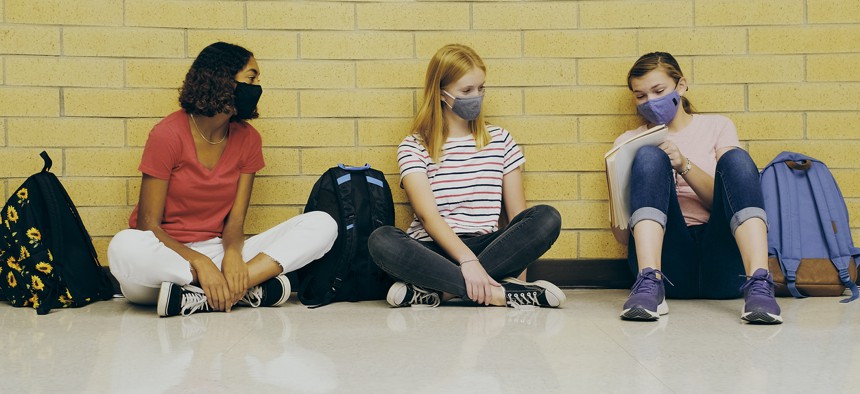One State Begins to Grapple With Pandemic’s Toll on Youth Mental Health

istock.com/RichLegg
A sweeping bill passed by lawmakers in Connecticut would grant minors unlimited counseling sessions without parental consent, among other changes.
Students could be excused from school for up to two mental health days per year and would be able to see a behavioral health provider for an unlimited amount of sessions without notifying their parents, under legislation approved last week by the Connecticut House of Representatives.
The bill, a wide-ranging piece of legislation that also addresses standards for virtual learning, passed the Senate 24-9 in May and the House 112-34 on June 2. Proponents of the bill said it was needed to address the myriad ways that children have been affected by the pandemic, including disruption of their daily routines and isolation from their peers.
“The pandemic has affected every single person,” Rep. Liz Linehan, a Democrat from Cheshire, said during floor debate on the bill. “I think we can all agree that none have been more affected than our children. We’re talking about the isolation, food insecurity, mental health concerns, not being around their friends, not being able to go to school for extended periods of time...the effects of the pandemic on our children will last a long, long time. This is an epidemic within the pandemic, and this bill seeks to address those concerns.”
Among other things, the legislation would require the state to implement a youth suicide prevention training program, based on a “Question, Persuade and Refer,” or QPR, model that’s “known as the CPR of suicide prevention,” Linehan said. The training would be given by the state Office of the Child Advocate and the Suicide Advisory Board once every three years.
Eligible participants would be selected by local health officials but could include teachers, youth program volunteers and school employees, all of whom would learn to train others, Linehan said.
“What we will be doing is train people to become trainers, so we can ultimately have a wide web of people who are able to help,” she said.
The bill would also require “certain licensed health care professionals” to undergo mental health training and suicide prevention screening and training, and require local and regional school boards to integrate social-emotional learning principles into professional development programs.
It would also allow K-12 students to take up to two mental health days during the school year, on top of any mental health days currently permitted in individual districts and in addition to allotted sick days, though the days may not be taken consecutively.
Finally, the bill would amend and expand an existing state law that allows minors to receive six outpatient mental health treatments without parental consent. The legislation “eliminates the ceiling,” Linehan said.
That provision was a sticking point for Republicans, who said that limit was a necessary safeguard that allowed parents to be at least somewhat involved with their children’s psychological care.
“We’re setting a standard with regard to who gets to decide what’s in the best interest of the child,” said Rep. Anne Dauphinais, a Republican from Killingly. “That’s where I have difficulty with this piece of the bill—expanding those visits and continuing that.”
But proponents said the provision was not intended to hide children’s health information from their parents, but to protect children in abusive households or other detrimental situations who need help but can’t ask permission to seek it.
The bill, Linehan noted, “explicitly allows a provider to contact a parent if it’s for the child’s well-being and the treatment is solely for mental health.”
The legislation received broad support from child advocacy organizations in the state, including the Child Guidance Center of Southern Connecticut, the Center for Children’s Advocacy and the Connecticut Children’s Medical Center, whose chief behavioral officer noted in his testimony an alarming uptick in minors who tested positive for risks of suicide at the end of 2020.
“We have found a disturbing trend in recent months,” wrote Howard Sovronsky, a licensed clinical social worker. “The rates of positive screens in October 2020 increased to 19%, November was 24% and December was 21%. We need to act now to better support the mental health of children in Connecticut.”
The bill heads next to Gov. Ned Lamont. It’s unclear whether he will sign it, though the Democrat has previously supported initiatives to expand telehealth access and allocate federal funding to child-care programs.
Kate Elizabeth Queram is a senior reporter for Route Fifty and is based in Washington, D.C.
NEXT STORY: Democrats’ Elections Bill in Peril with Key Senator’s Opposition





